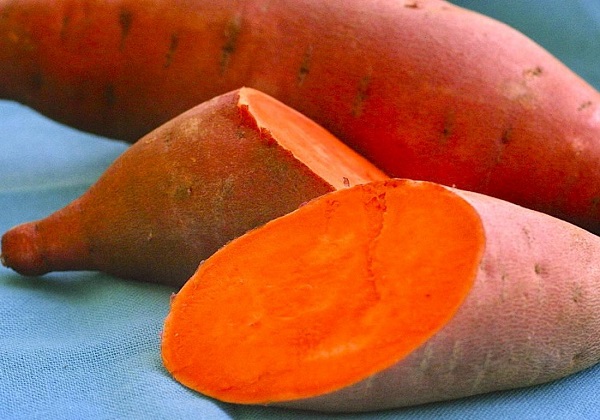
Nigerians have been urged to desist from consuming wheat and cassava and opt for the orange-fleshed sweet potato, which is healthier and contains more nutrients than the other two.
Making the call during an interview monitored in Abuja, a nutritionist, food specialist and CEO of Green Economy Alternative Africa, Mr. Douglas Akuba said the orange-fleshed sweet potato contains more vitamins A,C,E and several B vitamins than the wheat used for baking and cassava used for making ‘fufu’ in many Nigerian homes.
He said that this alternative can not be overemphasized, given the lopsidedness of the current global market, as a fall-out of the Russia-Ukraine war and its impact on food security in Africa.
“They are also rich in zinc and iron, potassium and fibre with excessive contains bone collagen as announced by the Cancer Prevention and Research Institute of the state,” he explained.
He, however, stressed that the consumption of sweet potato could eliminate Vitamin A deficiency. “Sweet potato,” he noted, “is better than wheat because it is cheaper while imported wheat is costly.
“With Vitamin A deficiency being one of the leading causes of micronutrient deficiencies in children up to the age of six and among pregnant women, flour made from orange-fleshed sweet potato could offer a helpful solution.
“Also, because the novel drying technology (of combining microwave and infrared applications) results in a higher retention of beta-carotene, the orange-fleshed sweet potato flour that is produced will be a particularly strong source of Vitamin A,” he said.
The expert said the human body converts the BC into Vitamin A (retinol) and retinol activity equivalents (RAE). Studies have shown that 13 units of BC convert into one unit of retinol (Vitamin A).
“That’s why a child of 1-3 years needs 300pg retinol activity equivalents (RAE) of Vitamin A daily while a child of four to five years old needs 400pg of Vitamin A daily,” he elucidated.
Akuba disclosed that the orange-fleshed sweet potato is also rich in calcium and iron folate, the leaves are an outstanding source of lutein, a micronutrient which helps prevent eye degeneration during ageing.
“The amounts of lutein far exceed other common green. Leaves are a good source of other healthy nutrients, including vitamins, minerals and a host of polyphenolics, omega-3 fatty acids and dietary fibre.
“Anthocyanins and polyphenolics are anti-oxidants and can help fight inflammation and cancer,” he explained.
The CEO said that most meals can be fortified with Vitamin A-rich sweet potato and mixing all food with the orange-fleshed sweet potato can become one of the most important diets that can be used in the country’s school feeding programme and internally displaced persons across the country, the same way the World Food Programme (WFP) provided fortified food with soya beans and maize or sorghum,” he said.
Akuba said that the Green Economy Alternative Africa is already creating a platform for bakers on the continent and in Nigeria to make use of the Vitamin A-rich, sweet potato puree for the entire confectionery in processed food products on the continent.
“Orange-fleshed sweet potatoes can be used in several ways, boil it as a root and eat it [or] turn it into French fries.
“As flour, the application of orange-fleshed sweet potatoes is more diverse. The flour can be used in baked products like fortified bread or biscuits, as stabilisers in soups, as a thickening agent (due to its rich dietary fibre) and because of its low viscosity it can be used to make baby food – it is easy for infants to swallow,” he added.

